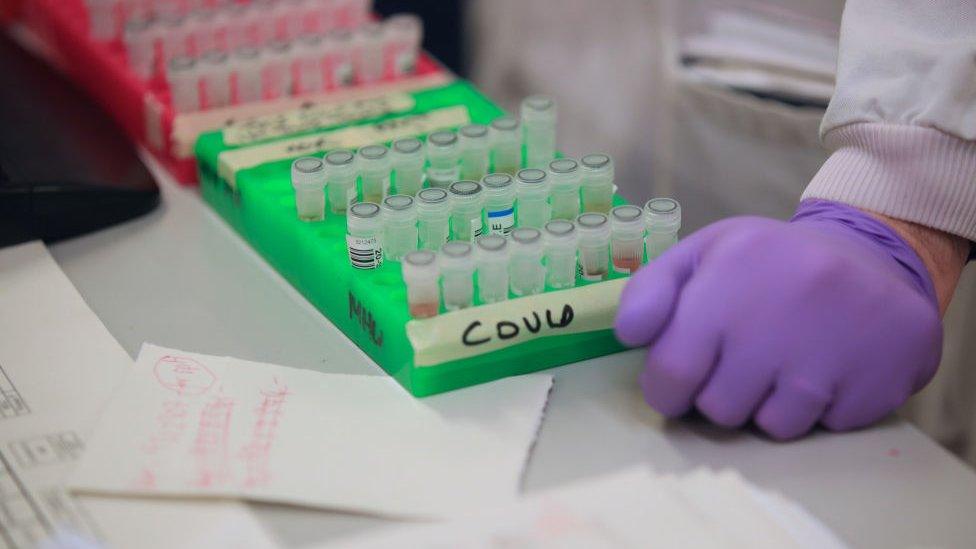Coronavirus: People with fever or 'continuous' cough told to self-isolate
- Published
Boris Johnson: "More families will lose loved ones before their time"
Anyone with a "new, continuous" cough or high temperature is now advised to self-isolate for seven days, as the UK government moves to the "delay" phase of its plan to tackle coronavirus.
PM Boris Johnson said it was "the worst public health crisis for a generation" and warned many families they would "lose loved ones before their time".
He said it was important to get the timing right for stricter measures.
In total, 10 people have now died in the UK with the virus.
Schools have been advised to cancel trips abroad, while people over 70 and those with pre-existing health conditions have been told not to go on cruises.
There have been 596 confirmed cases across the country. However, the actual number of people infected could be between 5,000 and 10,000, the government's chief scientific adviser Sir Patrick Vallance said.
As part of the new measures, testing will only focus on identifying people with the virus in hospital.
People with symptoms are no longer required to call NHS 111, as the system is under strain, but are instead urged to look for information on the NHS website, external and 111 online, external.

EASY STEPS: How to keep safe
A SIMPLE GUIDE: What are the symptoms?
GETTING READY: How prepared is the UK?
TRAVEL PLANS: What are your rights?

Speaking after an emergency Cobra meeting, Mr Johnson said: "Some people compare it to seasonal flu, alas that is not right. Owing to the lack of immunity, this disease is more dangerous.
"It is going to spread further and I must level with you, I must level with the British public, many more families are going to lose loved ones before their time."
He said there was no need to close schools at the moment - as the Republic of Ireland did just hours earlier.
He explained: "The scientific advice is that this could do more harm than good at this time - but of course we are keeping this under review and this again may change as the disease spreads."
Like other countries, the government is also considering calling for the suspension of major public events such as sporting fixtures - but this would be a measure primarily to protect public services.
"The scientific advice is this has little effect on the spread - but it does place a burden on other public services," Mr Johnson said.
However, Scotland has said that mass gatherings of more than 500 people should be cancelled from next week, to reduce the burden on emergency services.
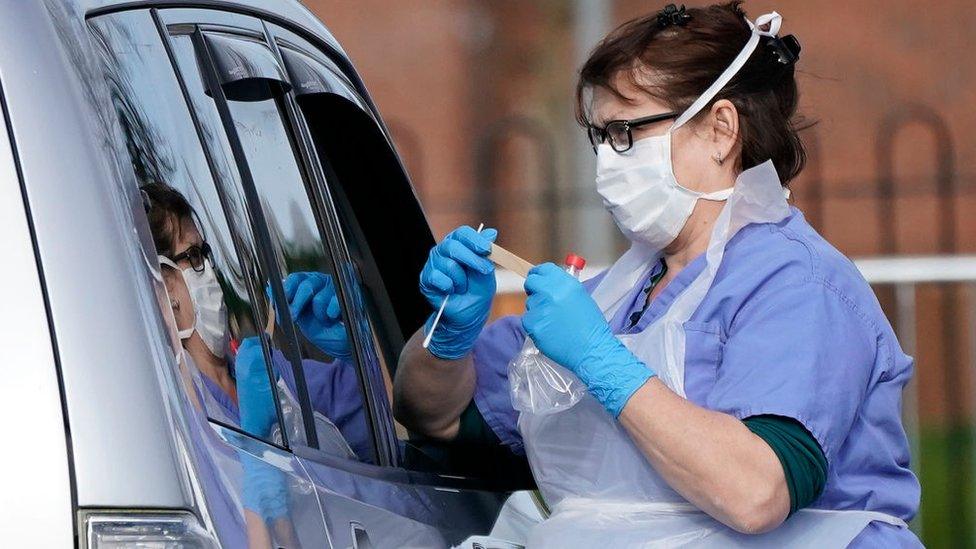
A member of the public is swabbed at a drive-through coronavirus testing facility in Wolverhampton
Ministers said it was important to get the timing right for stricter measures because people would tire of them after a few weeks.
Government health advisers are working on the assumption that Britain will not see infection rates peak for up to three months.
Future measures to control the spread of the disease could include stricter self-isolation arrangements, where if one household member falls ill, the entire household is asked to stay home for 14 days.
As the epidemic reaches its peak, it is likely elderly people and those with health conditions will be told to cut social contact and stay at home.
But the UK's chief medical adviser Prof Chris Whitty warned against taking such action prematurely.
"It has big practical implications," he said. "And may lead to loneliness and other issues which are clearly very undesirable for them.
"While we will need to move to that stage, we do not think this is the right moment along the pandemic to do so. But that point will come."
The prime minister also stressed that the most "draconian" measures must not be triggered too early.
Labour's shadow health secretary Jonathan Ashworth said he supported the government's decision to follow scientific advice regarding coronavirus, but he has called for "greater clarity" about decisions to "maintain public confidence".
He said: "I think perhaps the government is underestimating the extent to which the public are prepared to make adjustments so we can all defeat this virus."

Why aren't we closing schools and stadiums?

Other countries are closing schools, restricting movement and cancelling mass gatherings, such as football matches.
But health officials in the UK are taking a much more gradual, step-by-step approach. Why?
The obvious answer is that we have a relatively low number of cases so there is no need to take steps that will have profound social and economic consequences.
But we are also in this for the long haul. Countries taking drastic steps may well slow transmission. But how long can those steps be sustained?
At some point they have to be lifted and then the number of cases will rise.
If you can have some kind of controlled transmission, where the number of cases are kept low enough to allow the NHS to cope, is that a better way of managing it?
That's certainly what the experts and ministers in the UK have decided. They believe it gives them the best chance of saving lives in the inevitable spread of the virus across the country.

The number of UK cases rose by more than 100 on Thursday, up from 456 on Wednesday - with 491 in England, 60 in Scotland, 20 in Northern Ireland and 25 in Wales.
As of 09:00 GMT, a total of 29,764 people had been tested for the virus in the UK.
The latest two deaths were an 89-year-old and a woman in her 60s - at two hospitals in London. They both had underlying health conditions.
Mr Johnson warned that the number of UK cases will "rise sharply", and said the next phase of the government's plan aimed to delay the spread of the virus "and thereby minimise suffering".
He said even if the peak of the disease is delayed by a "few weeks" the NHS would be in a stronger position to handle it.
Public Health England has released new guidance , externalfor those staying at home because they have symptoms of the virus - a cough or a temperature of 37.8C (100F) or more.
The advice states:
Not to go to work, school, or public areas, use public transport or taxis - or even for a walk
Those with even mild symptoms of infection should stay at least two metres away from other people in their homes, and should sleep alone
Those with confirmed or suspected cases should use a separate bathroom
Up to now, under the previous strategy of containment, people were told to self-isolate only if they had the cough and fever but had also been to an affected country recently, or had contact with someone who had tested positive for the virus.
Up to 10,000 in UK "likely to have coronavirus" - chief scientific adviser Sir Patrick Vallance
The delay phase aims to lower the peak impact of the virus and push it away from the winter season - when pressures on the NHS are more acute because of issues including seasonal flu.
Delaying the outbreak's impact could also buy time for the testing of drugs and development of vaccines and/or improved therapies or tests to help reduce the impact of the disease.
In other developments:
The FTSE 100 dropped more than 10% in its worst day since 1987
Labour has scaled back its event to announce the winner of the party leadership contest on 4 April
Arsenal manager Mikel Arteta has tested positive for coronavirus and three Leicester City players have self-isolated after showing symptoms
Durham University has cancelled classroom-based lessons from Monday and the London School of Economics has also said that "all teaching activity" and exams will take place online
Barchester, which runs more than 200 care homes across the UK, has asked visitors to stay away
US President Donald Trump announced a suspension of travel to the US from 26 European countries - but the UK was not included on his list because of its "strong borders"

How have you been affected by coronavirus? Get in touch by emailing haveyoursay@bbc.co.uk, external.
Please include a contact number if you are willing to speak to a BBC journalist. You can also contact us in the following ways:
WhatsApp: +44 7756 165803
Tweet: @BBC_HaveYourSay, external
Send pictures/video to yourpics@bbc.co.uk, external
Please read our terms & conditions and privacy policy
- Published23 March 2020
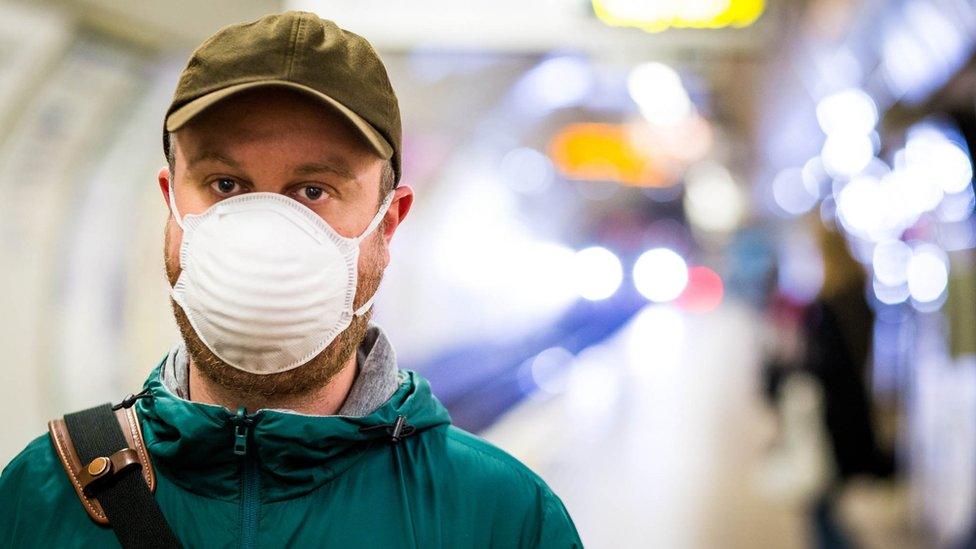
- Published12 March 2020
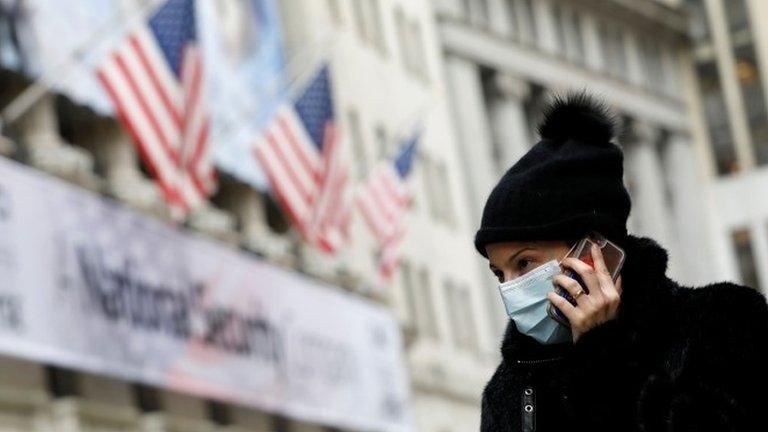
- Published11 March 2020
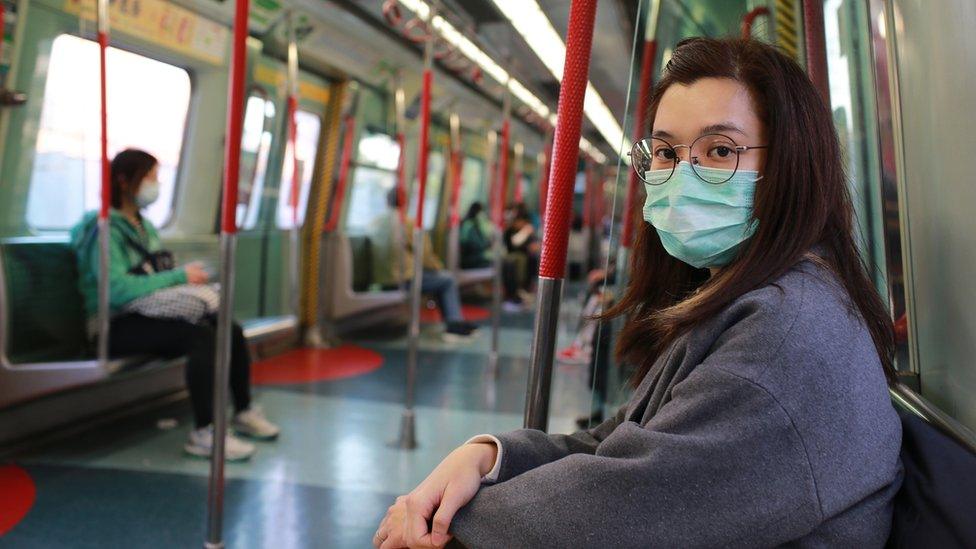
- Published12 March 2020
